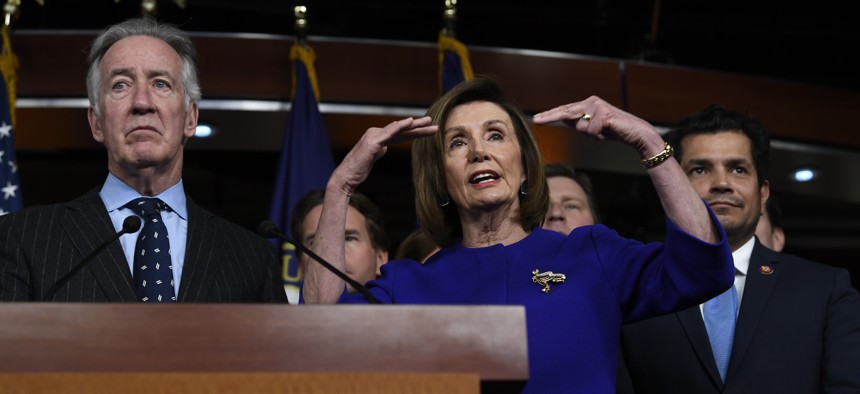Democrats, White House Make a Deal on the New NAFTA

House Speaker Nancy Pelosi of Calif., accompanied by House Ways and Means Committee Chairman Richard Neal, D-Mass., speaks at a news conference on Capitol Hill in Washington, Tuesday, Dec. 10, 2019, on Capitol Hill in Washington. AP Photo/Susan Walsh
House Speaker Nancy Pelosi announced a deal Tuesday on the United States-Mexico-Canada Agreement.
House Democrats on Tuesday announced a deal with the Trump administration to replace the 25-year-old North American Free Trade Agreement (NAFTA), earning praise from a broad coalition of industry associations and labor unions.
House Speaker Nancy Pelosi called the deal on the revamped United States-Mexico-Canada Agreement “infinitely better” than an initial proposal from the White House, saying Democrats were able to negotiate better enforcement mechanisms for worker protections and higher environmental standards.
Though the exact details of the agreement have not been released, some labor groups privy to the negotiations came out in support of the deal.
"Make no mistake, we demanded a trade deal that benefits workers and fought every single day to negotiate that deal; and now we have secured an agreement that working people can proudly support," AFL-CIO President Richard Trumka said in a statement.
He said the trade pact would for the first time include enforceable labor standards, including a way to inspect factories that are suspected of not living up to their obligations.
“This is more than a triumph for organized labor, it is a triumph for workers everywhere across America,” said Rep. Richard Neal, chairman of the House Ways and Means Committee who led negotiations with the administration.
Others were skeptical the deal would result in measurable impacts on wages or incomes for U.S workers.
“The USMCA will in no way offset or reverse the massive devastation caused by the original NAFTA agreement,” said the Economic Policy Institute in a statement.
At least one estimate puts American job losses attributable to NAFTA at 600,000. An estimate from the U.S. International Trade Commission indicates the USMCA will result in roughly 51,000 new manufacturing, mining, and farming jobs over the next six years.
“These are band aids,” said Robert Scott, a senior economist at EPI of the deal. “People are holding their noses and agreeing to support this because they got small concessions for their constituents. This deal remains an enormous turkey.”
American and Canadian officials gathered in Mexico City on Tuesday to sign the updated version of the USMCA.
President Trump wrote in a tweet that the deal will “be the best and most important trade deal ever made by the USA.”
A vote in the U.S. House of Representatives on the agreement is expected next week and the Senate will likely vote early next year.
Business leaders have in the past called for passage of the USMCA, citing the need to update NAFTA. The new agreement is forecast to incentivize a more than $23 billion increase in automotive parts sales in the United States, said Matt Blunt, president of the American Automotive Policy Council.
“The USMCA allows the U.S. auto industry to remain globally competitive by ensuring vehicles and auto parts are able to move freely across country lines,” he said.
U.S. Dairy Export Council said the USMCA will make important changes that will give American farmers and manufacturers exclusive access to the Canadian market and provides better trade protections.
Others, including the U.S. Chamber of Commerce, applauded news of the deal but were waiting to review the details included in the latest agreement.
Andrea Noble is a staff correspondent with Route Fifty.
NEXT STORY: In Two Blue States, Voters Back Democrats, But Show a Wariness Toward Taxes





